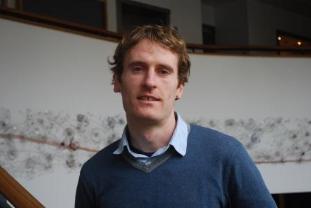News 2013
BEES postgrad wins Science for All
Thu, 21 Mar 2013
 Fergus McAuliffe, postgraduate student in the School of BEES is the winner of the 9th UCC Science for All competition which took place last night with his presentation “Soak it Up: Getting Trees to do the Dirty Work “.
Fergus McAuliffe, postgraduate student in the School of BEES is the winner of the 9th UCC Science for All competition which took place last night with his presentation “Soak it Up: Getting Trees to do the Dirty Work “.
Fergus explained his research on developing a zero-discharge wastewater treatment using willow trees. While wastewater contains high levels of contaminants that can be harmful to humans and the environment, these contaminants are the perfect source for willow trees which thrive in Ireland. This research will result in a sustainable means for wastewater treatment, which will be of great interest to the many septic tank owners who may fail inspection.
Fergus' work is supervised by Prof. Peter Jones and Dr. Padraig Whelan at the School of BEES.
Communicating scientific research in an easily understandable manner to a lay audience is the aim of Science for All, the UCC postgraduate student public presentation competition.
This year’s competition, also included presentations on “mining” the genes of gut bacteria, understanding leukemia, abdominal pain in Irritable Bowel Syndrome and the impact of dietary fat on gut bacteria and obesity.
The panel of judges for the Final was chaired by Ms Anne Marie O’Sullivan, H+A Marketing+PR and also included Mr John Dolan, Features Editor, Evening Echo, Mr Trevor Holmes, Vice President for External Relations, UCC and Dr Julie O’Donovan, Cork Maths Centre and winner Science for All and Science Speak (2009). Before presenting the award, Ms O’Sullivan congratulated all the students on the high quality of their presentations and praised them for how well they communicated their research to the large lay audience who attended.
The competition, now in its 9th year, is organised jointly by the College of Science, Engineering and Food Science and the Alimentary Pharmabiotic Centre, UCC and forms part of a postgraduate module in Science Communication and Outreach (PG6014).
Full text of Fergus' abstract for the Science for All competition:
Soak It Up: Getting trees to do the dirty work
In Ireland it rains – a lot. With all of this rainfall, how is it that sometimes we can run short of clean drinking water?
The reason is that we use water in many ways. Not only do we use water for drinking; we also use it to get rid of our wastes from sinks and toilets. Each of us produces 150 litres of wastewater per day. Every day across Ireland 84 Olympic-sized swimming pools of wastewater leave our homes and enter treatment systems e.g. septic tanks. It is very important that all of this wastewater is cleaned properly by the treatment systems.
Unfortunately, adequate wastewater treatment does not always occur. There are many areas of Ireland where the treatment systems do not work properly. This is often due to poor soil conditions. Poorly treated wastewater can then contaminate local drinking water supply.
How do I get trees to do the dirty work? My research focusses on a sustainable means for wastewater treatment through using willow trees. While wastewater contains high levels of contaminants that can be harmful to humans and the environment, these contaminants are the perfect food source for willow trees. As the trees grow the wastewater is used up i.e. “Soak It Up”.
I am developing a zero-discharge willow system. The “zero-discharge” part means that there is no wastewater left over at the end. As there is no wastewater leaving the willow system, the risk of polluting drinking water supply and the environment is much reduced.
